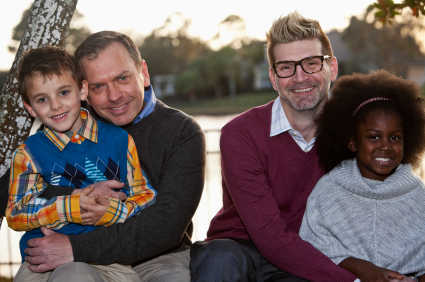 David Robison always knew he wanted to have kids, so he set out to find a partner who wanted the same thing. After years of searching, of dating and dreaming, he finally found his perfect match — someone who wanted children, too; a stable home, a family to come home to. Six years ago, at a ceremony in Canada, Robison married Donald Kane. Two years later, the two men fostered and then adopted their son, Michael.
David Robison always knew he wanted to have kids, so he set out to find a partner who wanted the same thing. After years of searching, of dating and dreaming, he finally found his perfect match — someone who wanted children, too; a stable home, a family to come home to. Six years ago, at a ceremony in Canada, Robison married Donald Kane. Two years later, the two men fostered and then adopted their son, Michael.
When Robison and Kane started their family, they became part of two of the defining cultural shifts of their generation. When they married, Robison and Kane joined other pioneers in the enormous political and social migration of gays and lesbians into mainstream society; a movement toward awareness, acceptance and assimilation of gays and lesbians. Although marriage is a personal issue, for the gay and lesbian couples that are denied that right in Washington state, it is a political issue as well.
But when Robison and Kane adopted Michael, they also joined another enormous cultural shift — the so-called “Gayby Boom” — a term coined in a 1990 Newsweek article for the growing trend of children being raised by gay couples. Word Spy, a website that tracks and defines new words and terms, defines the Gayby Boom as “a sharp increase in the number of gay parents, which includes lesbians having babies and same-sex couples adopting children.”
There are as many as 9 million children living with gay parents in the U.S. today, according to a 2000 study of U.S. Census data by the Human Rights Campaign, a nonprofit organization that works for the rights of gay, lesbian, bisexual and transgender (GLBT) individuals. The same study found an estimated 15,900 gay and lesbian couples living in Washington, an increase of 266 percent over 1990 statistics. Though interpretation of Census data varies, it is clear that gay parenting is a growing trend.
In a 2006 Seattle Times article, reporter Lornet Turnbull, also citing U.S. Census data, wrote that “19 percent of the 1,423 Washington households headed by gay men and 23 percent of the 1,881 run by lesbians included children under 18.”
Certainly, anecdotal evidence indicates that the number of gay families in the Puget Sound region is sharply on the rise. “We have definitely seen an increase in lesbian couples attending childbirth classes, and gay couples attending our adoptive baby care classes,” says Janelle Durham, program director for the Program for Early Parent Support (PEPS) and a childbirth teacher for Great Starts. “At our Capitol Hill location, I would guess there is one lesbian couple in every class of 10 families.”
The ways in which gay couples become parents varies, and most will have to clear hurdles never faced by their heterosexual peers. But with the growing number of gay parents has come an increase in options, and a wealth of resources for alternative families living in the Puget Sound area.
Finding help
When Robison and Kane set out to become parents, they turned to a local nonprofit called Rainbow Families of Puget Sound, which helps local GLBT families connect with community and resources. The pair went to a Rainbow Families picnic to ask other parents for advice on navigating the legal and political challenges two married men might face in search of children. Robison was so impressed with the group that he now serves on its board of directors. Currently, there are more than 200 local families that count themselves among the group’s members.
For legal help, Robison and Kane sought the assistance of Amara, a Seattle-based private adoption, foster care and pregnancy counseling agency that offers services to everyone, regardless of marital status, sexual orientation or religion. Through their work with Amara, Robison and Kane developed a plan for an open adoption with Michael’s birth mother, drafting an agreement that guaranteed her annual visits. But Robison takes Michael to see his mother almost every two weeks, and says the frequent visits have worked out well for their family. “When all the other kids talk about ‘mom,’ Michael knows very well who his birth mother is, even though she’s not his ‘parent.’”
Added costs
Robin and Meghen Magonegil also knew they wanted children. The two women married in a public commitment ceremony 10 years ago; they now have a home on Vashon Island. Six years ago, they began the process of having a baby by seeking out an insemination service that is friendly to alternative families. With the help and advice of other lesbian couples, the pair settled on a sperm bank in Oregon.
The modern insemination process granted the Magonegils access to options for their family. For example, their 6-year-old daughter, Aiden, and 3-and-a-half-year-old son, Finn, are biological siblings, which Meghen carried and delivered. From the beginning, the couple knew they wanted more than one child, so they purchased multiple vials from the same donor. Unlike heterosexual couples, the Magonegils can’t decide years later that they want another biological sibling; when purchased sperm is gone, it’s gone.
And starting a family through artificial insemination is not cheap. “The process costs $600 per shot,” says Robin. “Insemination is not covered by insurance.” If Meghen hadn’t carried the babies, she says, she could have paid as much as $20,000 for in vitro fertilization.
The added costs of gay parenthood don’t end when the children are born. Washington state's domestic partnership laws do not grant parental rights to gay parents, so, to ensure their legal rights, the Magonegils went through what’s called “second-parent adoption,” which allows a second parent to adopt a child without the first parent losing any parental rights.
To secure a second-parent adoption, the Magonegils had their family evaluated by a social worker. At first, Robin bristled at the idea of inviting someone to judge whether her family was worthy of legal protection. “Why should we have to go through the process when any straight family can have as many kids as they want?” The Magonegils’ case worker visited their Vashon Island home to investigate their home life and the kids’ stability within it. Robin says the evaluation left her feeling “affirmed,” because the case worker documented that she “sees a lot of balance” in their family.
When she talks about the challenges of being a gay parent, Robin says she’s happy she doesn’t face outright bigotry in the Pacific Northwest. “We live in a community where there are all kinds of parents,” she says. “For most people, it’s like ‘big deal.’”
Robin and Meghen say they can’t imagine life without kids; their kids say they like having two mommies. Aiden says she has some “friends with two moms and some friends with just a mom and a dad.” Finn knows other families are different than his. He recently spent a weekend with friends during which two fathers watched him. Robin says he had such a good time, “he came away from the weekend wanting two dads.”
Four-way parenting
David Brunelle did not always know he wanted children. Brunelle — a pediatric physician — took an unusual path to fatherhood. When he worked at the Polyclinic in Seattle, he developed a reputation as “the go-to gay-friendly pediatric care provider.” Through his practice, Brunelle met Laura Chase, Rachel Torez and David Woods, a trio of friends that would soon redefine Brunelle’s own life.
Chase and Torez had been together for five years and wanted a child. The two women felt it was important for their child’s biological father to also be a father figure. David Woods, a childhood friend of Chase’s, also wanted a child, and the couple knew right away that Woods would make a great candidate as both a sperm donor and a father figure. Shortly thereafter, Chase became pregnant and then gave birth to Kalan.
David Brunelle joined the somewhat elaborate family after he and Woods dated for 18 months. Together, Brunelle and Woods began sharing parenting responsibilities with Chase and Torez. “Not only does Kalan have two daddies, she also has two mommies,” Brunelle says.
The tenuous state of legal coparenting agreements in Washington can barely accommodate two same-sex parents, let alone providing for a gay couple to legally adopt a child with a lesbian couple. Brunelle says Torez went through the court system to get her name placed on Kalan’s birth certificate. Woods’ and Chase’s parental rights are protected through their biological ties to Kalan. But Brunelle’s rights are only protected by the personal agreements the parents have made together.
The unusual arrangement has so far withstood life’s tests. Brunelle and Woods separated when Kalan was 4 and a half. Brunelle says the breakup, though difficult, was necessary; the two men are “better apart than together.” For Kalan’s sake, the family decided to work together to keep their parenting relationships intact. “It isn’t always easy,” Brunelle says. “We decided early we would be as honest as the day is long and we wouldn’t play games.”
The parents have worked out a schedule for when each parent is responsible for Kalan. They split summers, vacations and holidays. Kalan spends the first and third weekends during the school year with her mothers, and the remaining weekends with either Brunelle or Woods.
The family also schedules a quarterly family meeting to discuss the big issues: money, activities, safety, health concerns and academics. During the meetings, they agree to follow simple rules. “We don’t let the kid split the team,” Brunelle says. They also don’t let their personal conflicts get in the way of their shared desire for what’s best for Kalan.
When the parents found their relationship in serious conflict, they worked to resolve the conflict together. “We spent nine months in counseling,” Brunelle says. “All four of us. We were developing a few bad habits and some frustrations with each other. We decided we should nip them in the bud.”
Brunelle says Kalan is thriving within the unique parenting arrangement. “We’re graced with a really good kid,” he says. She may have four parents raising her, but she also “has four people to look to for what she needs.”
Brunelle recalls a moment last Thanksgiving when each family member stated what they were thankful for. “When it was her turn, Kalan, 9, said, ‘I’m thankful I have a mommy, a mama, a Big Daddy and a Bernie.’”
Douglas Grey is a part-time writer and a full-time dad.
Resources
Rainbow Families of Puget Sound
Adoption Open: A page loaded with information and resources for gay parents, including a reading list for children.
Support









